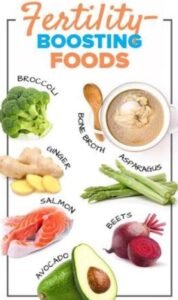If you haven’t read part 1 of this blog yet, you might want to start there (it covers the basics and the potential connection to fertility): Probiotics and Fertility Diet Part 1.
Otherwise more on those critters in our gut…
Probiotics and Fertility- An Unbalanced Vaginal Microbiome
Research has found a connection between the microbiome and fertility and how probiotics improve fertility. The abnormal vaginal microbiota has been found to negatively impact the birth rate.
Studies
 A Danish study of 130 women undergoing in vitro fertilization (IVF), researchers found that those who had abnormal vaginal microbiota had a harder time getting pregnant.
A Danish study of 130 women undergoing in vitro fertilization (IVF), researchers found that those who had abnormal vaginal microbiota had a harder time getting pregnant.
Of the 84 patients who completed IVF treatment, 29 were able to get pregnant. Only 9% of those who had abnormal vaginal microbiota obtained a clinical pregnancy, whilst 44% of the women with normal microbiota bacteria were able to get pregnant.
A Philadelphian study of 1,950 women found that a diagnosis of a common infection (bacterial vaginosis) in the first trimester more than doubled the risk of spontaneous pregnancy loss in the next trimester. It also found that the low levels of the Lactobacillus bacteria in the first trimester also significantly increased the risk of pregnancy loss.
A BJOG Publication Study with over 700 pregnant women, found that those with abnormal vaginal flora – specifically those lacking lactobacilli bacteria – were 75% more likely to have a preterm birth. Also, the risk of miscarriage was significantly increased.
Create a Healthy Digestive System with Probiotic Bacteria
The importance of probiotic bacteria in our bodies is uncontested, but how, and to what extent, we can influence this delicate balance is still being researched.
The research results are very encouraging though. Many experts recommend we ‘cultivate the garden within’ for a healthy body by adopting the right diet, reducing stress, avoiding antibiotics whenever possible, and in some cases supplementing with probiotics and prebiotics.
Foods that Contain Probiotic Bacteria and Prebiotics
We may be able to influence the balance of bacteria in our bodies with food in two ways: by eating foods that contain the good bacteria and by eating the types of food that good bacteria feed off of (prebiotics).
Choose Carefully: not all traditionally fermented foods contain these helpful bacteria. Industrialization of fermentation has lead to efficiency in production and more consistent tasting products, however, it ruins some of the healthful benefits by killing the probiotic bacteria. Pasteurizing, for example, effectively kills all the healthful bacteria.
Foods that naturally contain probiotic bacteria are cultured/fermented foods.
Foods with Probiotic Bacteria
- Raw Sauerkraut
- Kimchi
- Cottage cheese
- Kefir
- Yogurt
- Tofu
- Miso
- Tamari sauce
- Soy sauce
- Tempeh
- Pickles (made with brine not vinegar)
- Pickled ginger
- Beer
- Wine
- Vinegar
Interestingly, cultured foods have long been recognized as an integral part of a healthy diet like Miso in Japan, Lassi drinks in India, Kimchi in Asia and sauerkraut in Europe – just to name a few.
The second way to boost probiotic bacteria is to eat foods that provide prebiotics. Two well documented prebiotics are FOS and inulin, which are naturally occurring carbohydrates found in the following foods.
 Foods that Contain Prebiotics
Foods that Contain Prebiotics
- Asparagus
- Chicory
- Chinese chive
- Burdock root
- Eggplant
- Fruit (especially bananas)
- Garlic
- Jerusalem artichokes
- Leeks
- Legumes
- Onions
- Peas
- Soybeans
- Sugar maple
- Tomatoes
Probiotic Supplements
Probiotic supplements are high doses of specific strains of beneficial bacteria in an easy to take form (liquid, power, or capsule). Initial studies are encouraging and suggest that probiotic supplements can be used to treat various health issues.
Numerous doctors, naturopaths and nutritionists recommend probiotics for this reason, however, the extent of the claims being made has not yet been rigorously proven through research.
Elizabeth Lipski, author of Digestive Wellness, recommends that already healthy people can maintain their healthy bacteria by eating cultured foods, but says supplements are necessary when disease producing microbes have colonized.
Dr. Haas makes a similar recommendation in his book, Staying Healthy with Nutrition, by recommending probiotics for use after a course of antibiotics or to treat yeast overgrowth, otherwise, he says, “I recommend them for one to two weeks once or twice a year…”.
It’s important to note that probiotics do not all have the same quality.
Some guidelines for choosing probiotics are:
- Probiotics requiring refrigeration at the store and at home tend to be the best
- Accompanying probiotics with prebiotics may be more effective since this provides food for the bacteria once they they enter your digestive system
- Probiotics that include several strains are helpful
Elizabeth Lipski also emphasizes in her book, Digestive Wellness the following tips:
- Different combinations will work for different people and to a greater or lesser effect.
- You’ll have to experiment with different brands and see which are most helpful.
- Remember to begin with a small dosage and increase slowly. You are changing your gut ecology and you want to do it gradually.
Another important aspect to taking probiotics that Elizabeth Lipski points out is that it’s not necessarily a bad sign if the supplements cause a sudden bloating, diarrhea, gas, or worsening of symptoms. She explains that, as the bad bacteria and fungus die, they release chemicals that aggravate symptoms. If this happens, she recommends beginning again and building up slowly.
Naturopath Linda Page suggests that probiotic supplements are not for everyone because each person’s digestive system is highly individual. She recommends getting probiotic bacteria from food and by supplementing with prebiotics.
The good side to this new dietary supplement is that probiotics have no toxic effects and the American Cancer Society addresses the safety of one of the more popular probiotics strains, Lactobacillus acidophilus, by stating that; except in rare cases acidophilus is safe.
Probiotics and Fertility Conclusion
Although, I haven’t covered them in detail here prebiotics are also available in supplemental form.
For my next blog I’ll be writing about how I’m getting probiotics and prebiotics, how my body likes/dislikes them along with a list of some helpful resources. Until then, happy bacteria consumption.





